South African Nobelist Coetzee on Israel and apartheid: ‘Draw your own conclusions’
Page 1 of 1
 South African Nobelist Coetzee on Israel and apartheid: ‘Draw your own conclusions’
South African Nobelist Coetzee on Israel and apartheid: ‘Draw your own conclusions’
Rarely are introductions more gripping than main acts, yet that was the case with keynote author J.M. Coetzee’s reading last night at the Palestine Festival of Literature. Now in its ninth year, the arts fair brings together literary giants and up-and-comers to tour Israel and the occupied Palestinian territory, where the writers give free recitals and workshops along the way.
The authors traveled by bus, lugging their suitcases through checkpoint turn-stiles. Among their day trips, they followed locals down the divided streets of Hebron, and explored the now chic Israeli gallery town of Ein Hod, which was a Palestinian village before 1948. The original inhabitants were forbidden to return and instead gaze upon their former homes from a hilltop two kilometers away under the peculiar status of a “present absentee,” which is legal-speak for those who shall remain dispossessed.
Such sites are bound to affect a tourist.
If that tourist is also a legendary South African intellectual known for diving into the dynamics of race and country and the force of empire, such as Coetzee, then this tourist’s analysis becomes the most anticipated event of the night.
Coetzee is not known as being much of a publicity man. He is by no means a recluse, but he gives interviews sparingly, and did not sit for one while attending the literature festival.
His books garner acclaim and are taught across the globe in university classrooms in a range of disciplines from English to critical race theory. He won a Nobel Prize in literature in 2003 for among other achievements his first novel Waiting for the Barbarians (1980), a parable for South Africa or any fading colonial outpost.
“I was born and brought up in South Africa and so naturally people ask me what I see of South Africa in the present situation in Palestine,” Coetzee said at the Ramallah closing event of the literature festival, standing on a stone and earthen stage in the courtyard of a great Ottoman building. The audience was a mix of well-to-do artistic types, hipsters, students and the West Bank’s hard-working and under paid professional class. They have one thing on their mind: did you find apartheid here?
Probably, but Coetzee did not say outright.
He explained he knows what apartheid looks like, its mechanics, but avoids throwing around the term. “Like using the word genocide to describe what happened in Turkey in the 1920s, using the word apartheid diverts one into the inflamed semantic wrangle, with which cuts short the opportunities of analysis,” he said.
“Apartheid was a system of enforced segregation based on race or ethnicity, put in place by an exclusive, self defined group in order to consolidate colonial conquest particular to cement its hold on the land and natural resources,” Coetzee said, relaying this definition almost verbatim in application to Jerusalem and the West Bank, minus the word apartheid.
Ultimately, Coetzee landed on “Draw your own conclusions,” to which he received an even louder round of applause than when the DJ was announced to take stage about an hour later.
Coetzee read from a prepared statement handwritten on unlined sheets of paper, recited in the fashion of a poet reading prose. (Read Coetzee’s full introduction at the bottom of this post)
For its part, the Israeli government has found the apartheid comparison particularly rancorous. With the word becoming exceedingly common among pro-Palestinian activists, Israel’s Prime Minister has gone to the lengths of asking other governments to remove its use from public spaces. Finance minister Yair Lapid said earlier this year Israeli apartheid posters in London’s underground metro were “antisemitic” and “anti-Israel.”
In 2008 the Palestine Festival of Literature began with a commitment to embody Edward Said’s words of, “the power of culture over the culture of power.”
From May 21st to May 26th the writers performed for primarily Palestinian audiences, reading from their published works. For some it doubled as a return to a homeland.
“My mother’s side is from Yaffa and my father’s side is from Haifa and Nazareth,” spoken word poet and Palestinian-American Remi Kanazi said when performing a piece about a 2014 visit. The emotional backdrop of that visit: “a very intensely awesome and proud Palestinian mother and family and coming back to Palestine for the first time, and always kind of feeling unrooted and wanting to grasp onto the ground that I was with and wasn’t able to properly do so.”
Although not everyone coming home was able to get home.
British-Palestinian Ahmad Masoud was denied entry at the border with Jordan. He wrote a blog post about the experience, which left him in tears hugging the festival’s organizer and saying goodbye to a new friend, festival participant and Manhattan bookstore owner Sarah McNally:
“‘What does that even mean?’ I was genuinely confused
‘Go back to Gaza’ he carried on
“’But I can’t’ I bloody can’t, I damn can’t, I truly and honestly can’t,” wrote Masoud whose words were read aloud to the Ramallah audience by a fellow writer.
For others, the festival marked a return to a temporary place of residence. Author Ben Ehrenreich journeyed to participate in the literature fete weeks before the publication of his latest book, The Way to the Spring: Life and Death in Palestine (2016).
Have things changed since he was here at the beginning of the year, no. “I’ve only been back a few days and I wish I could say otherwise, but my superficial impression is that the situation around the West Bank is one of general paralysis,” he told Mondoweiss.
“Everyone I speak with seems quite depressed, and more so than usual. Arrests are up, demolitions are up, land is being seized at an accelerated pace, and the last eight months have only brought more funerals,” Ehrenreich said.
Both Ehrenreich and Kanazi are friends of this site. We wish them well.
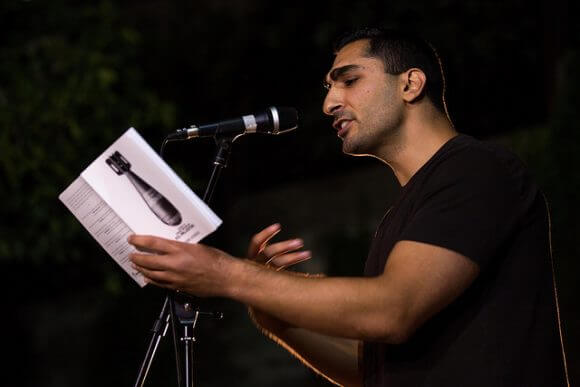
RAMALLAH, PALESTINE – MAY 27: Remi Kanazi performs at the closing event at the Sakakini Cultural Centre May 27, 2016 in Ramallah, Palestine. (Rob Stothard for The Palestine Festival of Literature)
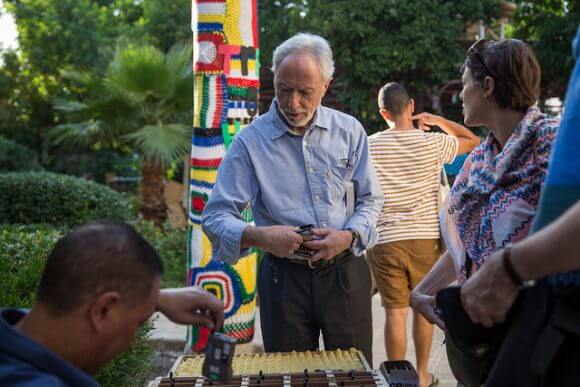
NABLUS, PALESTINE – MAY 25: Festival participant J.M. Coetzee takes a set of headphones at a public event in the Municipal Library Gardens on May 25, 2016 in Nablus, Palestine. (Rob Stothard for The Palestine Festival of Literature)

RAMALLAH, PALESTINE – MAY 27: Festival goers listen to J.M. Coetzee read at the closing event at the Sakakini Cultural Centre May 27, 2016 in Ramallah, Palestine. (Rob Stothard for The Palestine Festival of Literature)

RAMALLAH, PALESTINE – MAY 21: A table of merchandise for sale at the opening event of the annual Palestine Festival of Literature at The Ottoman Court on May 21, 2016 in Ramallah, Palestine. (Rob Stothard for The Palestine Festival of Literature)
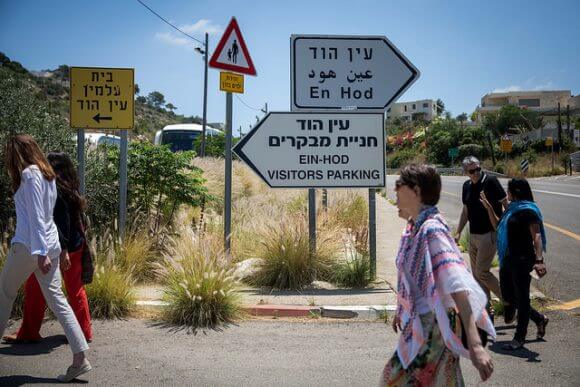
EIN HOD, PALESTINE – MAY 25: Festival participants visit Ein Hod, an Israeli artist colony in a former Palestinian village, one of very few that wasn’t destroyed in 1948 on May 25, 2016 in Ein Hod, Palestine. (Rob Stothard for The Palestine Festival of Literature)
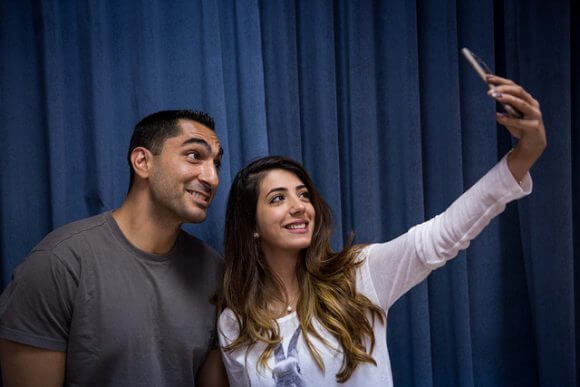
BETHLEHEM, PALESTINE – MAY 23: Festival participant Remi Kanazi poses for a selfie with a student at Bethlehem University on May 23, 2016 in Bethlehem, Palestine. (Rob Stothard for The Palestine Festival of Literature)
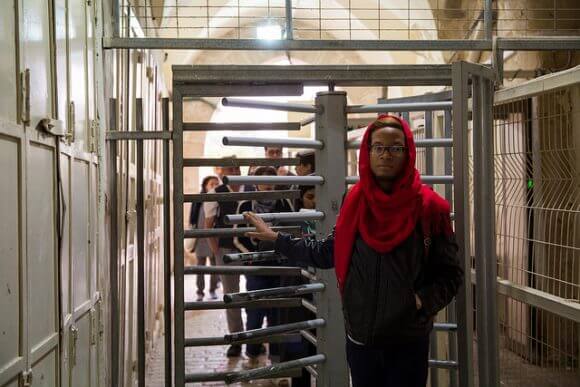
HEBRON, PALESTINE – MAY 24: Festival participant Rickey Laurentiis walks through a checkpoint in Hebron on May 24, 2016 in Hebron, Palestine. (Rob Stothard for The Palestine Festival of Literature)
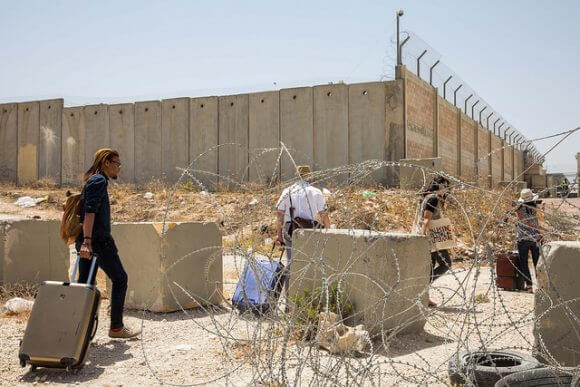
QALANDIA, PALESTINE – MAY 22: Festival participants travel through the Qalandia checkpoint between Jerusalem and Ramallah on May 21, 2016 in Qalandia, Palestine. (Rob Stothard for The Palestine Festival of Literature)
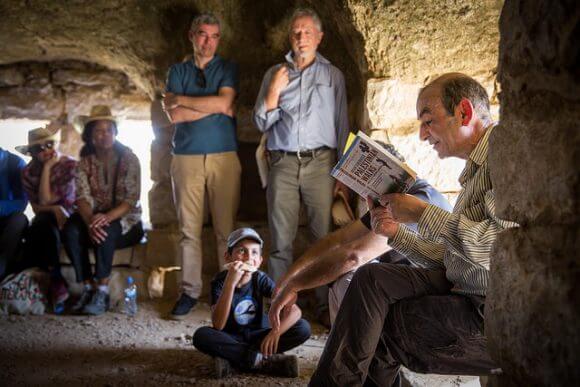
RAMALLAH, PALESTINE – MAY 22: Raja Shehadeh reads to festival participants during a walk in hills on the outskirts of Ramallah on May 21, 2016 in Ramallah, Palestine. (Rob Stothard for The Palestine Festival of Literature)
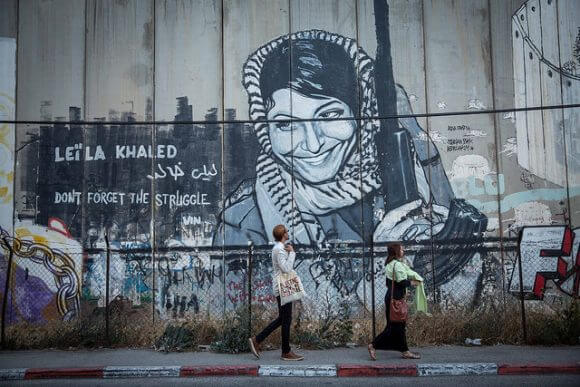
BETHLEHEM, PALESTINE – MAY 23: Festival participants walk along the wall on May 23, 2016 in Bethlehem, Palestine. (Rob Stothard for The Palestine Festival of Literature)
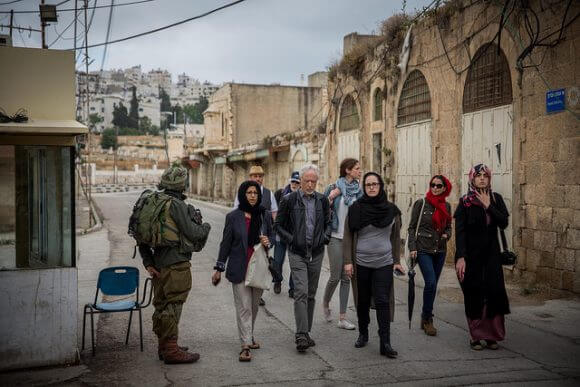
HEBRON, PALESTINE – MAY 24: Festival participants walk through an area of the city inhabited by Israeli settlers on May 24, 2016 in Hebron, Palestine. (Rob Stothard for The Palestine Festival of Literature)
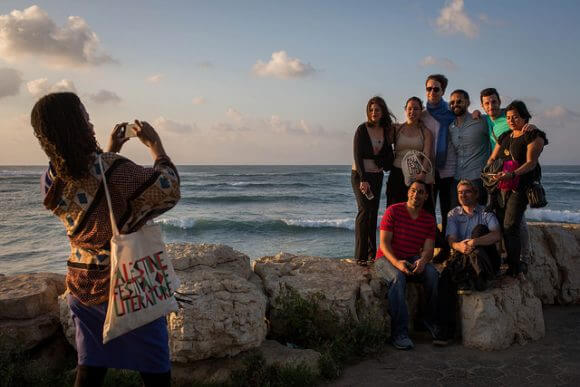
HAIFA, PALESTINE – MAY 24: Festival participants pose for a photograph at the Mediterranean coast on May 24, 2016 in Haifa, Palestine. (Rob Stothard for The Palestine Festival of Literature)
J.M, Coetzee’s full introduction:
The authors traveled by bus, lugging their suitcases through checkpoint turn-stiles. Among their day trips, they followed locals down the divided streets of Hebron, and explored the now chic Israeli gallery town of Ein Hod, which was a Palestinian village before 1948. The original inhabitants were forbidden to return and instead gaze upon their former homes from a hilltop two kilometers away under the peculiar status of a “present absentee,” which is legal-speak for those who shall remain dispossessed.
Such sites are bound to affect a tourist.
If that tourist is also a legendary South African intellectual known for diving into the dynamics of race and country and the force of empire, such as Coetzee, then this tourist’s analysis becomes the most anticipated event of the night.
Coetzee is not known as being much of a publicity man. He is by no means a recluse, but he gives interviews sparingly, and did not sit for one while attending the literature festival.
His books garner acclaim and are taught across the globe in university classrooms in a range of disciplines from English to critical race theory. He won a Nobel Prize in literature in 2003 for among other achievements his first novel Waiting for the Barbarians (1980), a parable for South Africa or any fading colonial outpost.
“I was born and brought up in South Africa and so naturally people ask me what I see of South Africa in the present situation in Palestine,” Coetzee said at the Ramallah closing event of the literature festival, standing on a stone and earthen stage in the courtyard of a great Ottoman building. The audience was a mix of well-to-do artistic types, hipsters, students and the West Bank’s hard-working and under paid professional class. They have one thing on their mind: did you find apartheid here?
Probably, but Coetzee did not say outright.
He explained he knows what apartheid looks like, its mechanics, but avoids throwing around the term. “Like using the word genocide to describe what happened in Turkey in the 1920s, using the word apartheid diverts one into the inflamed semantic wrangle, with which cuts short the opportunities of analysis,” he said.
“Apartheid was a system of enforced segregation based on race or ethnicity, put in place by an exclusive, self defined group in order to consolidate colonial conquest particular to cement its hold on the land and natural resources,” Coetzee said, relaying this definition almost verbatim in application to Jerusalem and the West Bank, minus the word apartheid.
Ultimately, Coetzee landed on “Draw your own conclusions,” to which he received an even louder round of applause than when the DJ was announced to take stage about an hour later.
Coetzee read from a prepared statement handwritten on unlined sheets of paper, recited in the fashion of a poet reading prose. (Read Coetzee’s full introduction at the bottom of this post)
For its part, the Israeli government has found the apartheid comparison particularly rancorous. With the word becoming exceedingly common among pro-Palestinian activists, Israel’s Prime Minister has gone to the lengths of asking other governments to remove its use from public spaces. Finance minister Yair Lapid said earlier this year Israeli apartheid posters in London’s underground metro were “antisemitic” and “anti-Israel.”
In 2008 the Palestine Festival of Literature began with a commitment to embody Edward Said’s words of, “the power of culture over the culture of power.”
From May 21st to May 26th the writers performed for primarily Palestinian audiences, reading from their published works. For some it doubled as a return to a homeland.
“My mother’s side is from Yaffa and my father’s side is from Haifa and Nazareth,” spoken word poet and Palestinian-American Remi Kanazi said when performing a piece about a 2014 visit. The emotional backdrop of that visit: “a very intensely awesome and proud Palestinian mother and family and coming back to Palestine for the first time, and always kind of feeling unrooted and wanting to grasp onto the ground that I was with and wasn’t able to properly do so.”
Although not everyone coming home was able to get home.
British-Palestinian Ahmad Masoud was denied entry at the border with Jordan. He wrote a blog post about the experience, which left him in tears hugging the festival’s organizer and saying goodbye to a new friend, festival participant and Manhattan bookstore owner Sarah McNally:
“‘What does that even mean?’ I was genuinely confused
‘Go back to Gaza’ he carried on
“’But I can’t’ I bloody can’t, I damn can’t, I truly and honestly can’t,” wrote Masoud whose words were read aloud to the Ramallah audience by a fellow writer.
For others, the festival marked a return to a temporary place of residence. Author Ben Ehrenreich journeyed to participate in the literature fete weeks before the publication of his latest book, The Way to the Spring: Life and Death in Palestine (2016).
Have things changed since he was here at the beginning of the year, no. “I’ve only been back a few days and I wish I could say otherwise, but my superficial impression is that the situation around the West Bank is one of general paralysis,” he told Mondoweiss.
“Everyone I speak with seems quite depressed, and more so than usual. Arrests are up, demolitions are up, land is being seized at an accelerated pace, and the last eight months have only brought more funerals,” Ehrenreich said.
Both Ehrenreich and Kanazi are friends of this site. We wish them well.

RAMALLAH, PALESTINE – MAY 27: Remi Kanazi performs at the closing event at the Sakakini Cultural Centre May 27, 2016 in Ramallah, Palestine. (Rob Stothard for The Palestine Festival of Literature)

NABLUS, PALESTINE – MAY 25: Festival participant J.M. Coetzee takes a set of headphones at a public event in the Municipal Library Gardens on May 25, 2016 in Nablus, Palestine. (Rob Stothard for The Palestine Festival of Literature)

RAMALLAH, PALESTINE – MAY 27: Festival goers listen to J.M. Coetzee read at the closing event at the Sakakini Cultural Centre May 27, 2016 in Ramallah, Palestine. (Rob Stothard for The Palestine Festival of Literature)

RAMALLAH, PALESTINE – MAY 21: A table of merchandise for sale at the opening event of the annual Palestine Festival of Literature at The Ottoman Court on May 21, 2016 in Ramallah, Palestine. (Rob Stothard for The Palestine Festival of Literature)

EIN HOD, PALESTINE – MAY 25: Festival participants visit Ein Hod, an Israeli artist colony in a former Palestinian village, one of very few that wasn’t destroyed in 1948 on May 25, 2016 in Ein Hod, Palestine. (Rob Stothard for The Palestine Festival of Literature)

BETHLEHEM, PALESTINE – MAY 23: Festival participant Remi Kanazi poses for a selfie with a student at Bethlehem University on May 23, 2016 in Bethlehem, Palestine. (Rob Stothard for The Palestine Festival of Literature)

HEBRON, PALESTINE – MAY 24: Festival participant Rickey Laurentiis walks through a checkpoint in Hebron on May 24, 2016 in Hebron, Palestine. (Rob Stothard for The Palestine Festival of Literature)

QALANDIA, PALESTINE – MAY 22: Festival participants travel through the Qalandia checkpoint between Jerusalem and Ramallah on May 21, 2016 in Qalandia, Palestine. (Rob Stothard for The Palestine Festival of Literature)

RAMALLAH, PALESTINE – MAY 22: Raja Shehadeh reads to festival participants during a walk in hills on the outskirts of Ramallah on May 21, 2016 in Ramallah, Palestine. (Rob Stothard for The Palestine Festival of Literature)

BETHLEHEM, PALESTINE – MAY 23: Festival participants walk along the wall on May 23, 2016 in Bethlehem, Palestine. (Rob Stothard for The Palestine Festival of Literature)

HEBRON, PALESTINE – MAY 24: Festival participants walk through an area of the city inhabited by Israeli settlers on May 24, 2016 in Hebron, Palestine. (Rob Stothard for The Palestine Festival of Literature)

HAIFA, PALESTINE – MAY 24: Festival participants pose for a photograph at the Mediterranean coast on May 24, 2016 in Haifa, Palestine. (Rob Stothard for The Palestine Festival of Literature)
J.M, Coetzee’s full introduction:
- See more at: http://mondoweiss.net/2016/05/nobelist-apartheid-conclusions/#sthash.2FpvsgID.dpufI came to Palestine to see and listen and learn and over the course of the past week I have seen and heard and learned a great deal. I come away with an enduring impression of the courage and the resilience of the Palestinian people at this difficult time in their history. Also of the grace and humor with which they respond to the frustration and the humiliations of the occupation.
I was born and brought up in South Africa and so naturally people ask me what I see of South Africa in the present situation in Palestine. Using the word apartheid to describe the way things are here, I’ve never found to be a productive step. Like using the word genocide to describe what happened in Turkey in the 1920s, using the word apartheid diverts one into the inflamed semantic wrangle, with which cuts short the opportunities of analysis. Apartheid was a system of enforced segregation based on race or ethnicity, put in place by an exclusive, self defined group in order to consolidate colonial conquest particular to cement its hold on the land and natural resources. In Jerusalem and in the West Bank—to speak only of Jerusalem and the West Bank—we’ve seen a system of enforced segregation based on religion and ethnicity, put in place by an exclusive self-defined group to consolidate the colonial conquest, in particular to maintain and indeed extend its hold on the land and its natural resources. Draw your own conclusion
Guest- Guest
 Re: South African Nobelist Coetzee on Israel and apartheid: ‘Draw your own conclusions’
Re: South African Nobelist Coetzee on Israel and apartheid: ‘Draw your own conclusions’
Well if he believes Palestinians are under Aparthied, then that would be the fault of fatah and Hamas who rule them.
I mean tell me one Middle east country that has more equal rights for its people than Israel does Sassy?
I mean tell me one Middle east country that has more equal rights for its people than Israel does Sassy?
Guest- Guest
 Re: South African Nobelist Coetzee on Israel and apartheid: ‘Draw your own conclusions’
Re: South African Nobelist Coetzee on Israel and apartheid: ‘Draw your own conclusions’
Paul Ettinger wrote:Well if he believes Palestinians are under Aparthied, then that would be the fault of fatah and Hamas who rule them.
I mean tell me one Middle east country that has more equal rights for its people than Israel does Sassy?
Really depends on who you are that determines who has equal rights though, doesn't it?
Racism Alive and Well in Israeli Society
A survey conducted on occasion of International Day for the Elimination of Racial Discrimination, observed Tuesday in the Knesset for the first time in Israel, demonstrated that racism is alive and well in Israeli society.
According to the survey, 43% of Israelis are unwilling to marry, or have their children marry, Ethiopians. More than 50% refuse to live in the same neighborhood as Arab families, 25% would not want their children to marry religious Jews and more than 10% were averse to their children marrying Sephardim. And these numbers are only the tip of the survey’s iceberg.
In response to the results, Mehereta Baruch, the former Ambassador contestant and member of the Ethiopian community, said, while officiating at the Knesset ceremony, “I feel bad for these people. They have a narrow minded view. Surely just as they hold these opinions, they hold themselves back from many beautiful things in life, because they are afraid to try and afraid from something different.”
Baruch, herself 20 years in Israel and married to an Ashkenazi Israeli continued in an interview on Army Radio, “maybe people are afraid when they look upon us from the outside, but when they begin to know us and grow close, they will see that we are not so bad.”
The International Day for the Elimination of Racial Discrimination is observed annually on 21 March, though it was observed in Israel a day later this year. On that day, in 1960, police opened fire and killed 69 people at a peaceful demonstration in Sharpeville, South Africa, against the apartheid “pass laws”. Proclaiming the Day in 1966, the General Assembly called on the international community to redouble its efforts to eliminate all forms of racial discrimination.
http://www.amren.com/news/2005/03/racism_alive_an/
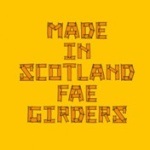
Irn Bru- The Tartan terror. Keeper of the royal sporran. Chief Haggis Hunter
- Posts : 7719
Join date : 2013-12-11
Location : Edinburgh
 Re: South African Nobelist Coetzee on Israel and apartheid: ‘Draw your own conclusions’
Re: South African Nobelist Coetzee on Israel and apartheid: ‘Draw your own conclusions’
So I ask a question on which country has better equal rights in the Middle east than israel and the left do their usual motto
Deflect, divert and cover up
See it happens every time
I am sure there is some racism in Israel, but what on earth has that got to do with laws on equal rights?
Do you want to see the levels of racism in Middle eastern countries do further expand on your deflection?
Deflect, divert and cover up
See it happens every time
I am sure there is some racism in Israel, but what on earth has that got to do with laws on equal rights?
Do you want to see the levels of racism in Middle eastern countries do further expand on your deflection?
Guest- Guest
 Similar topics
Similar topics» Israel and South African Apartheid
» The myth of Israel's alliance with apartheid South Africa (Mida)
» South Africa calls out Israel as an Apartheid State. United Nations
» Calling Israel an apartheid state is an insult to black South Africans (OPINION)
» Op-Ed: Israel--not Apartheid; Islam--Nothing but Apartheid
» The myth of Israel's alliance with apartheid South Africa (Mida)
» South Africa calls out Israel as an Apartheid State. United Nations
» Calling Israel an apartheid state is an insult to black South Africans (OPINION)
» Op-Ed: Israel--not Apartheid; Islam--Nothing but Apartheid
Page 1 of 1
Permissions in this forum:
You cannot reply to topics in this forum
» TOTAL MADNESS Great British Railway Journeys among shows flagged by counter terror scheme ‘for encouraging far-right sympathies
» Interesting COVID figures
» HAPPY CHRISTMAS.
» The Fight Over Climate Change is Over (The Greenies Won!)
» Trump supporter murders wife, kills family dog, shoots daughter
» Quill
» Algerian Woman under investigation for torture and murder of French girl, 12, whose body was found in plastic case in Paris
» Wind turbines cool down the Earth (edited with better video link)
» Saying goodbye to our Queen.
» PHEW.
» And here's some more enrichment...
» John F Kennedy Assassination
» Where is everyone lately...?
» London violence over the weekend...
» Why should anyone believe anything that Mo Farah says...!?
» Liverpool Labour defends mayor role poll after turnout was only 3% and they say they will push ahead with the option that was least preferred!!!
» Labour leader Keir Stammer can't answer the simple question of whether a woman has a penis or not...
» More evidence of remoaners still trying to overturn Brexit... and this is a conservative MP who should be drummed out of the party and out of parliament!
» R Kelly 30 years, Ghislaine Maxwell 20 years... but here in UK...